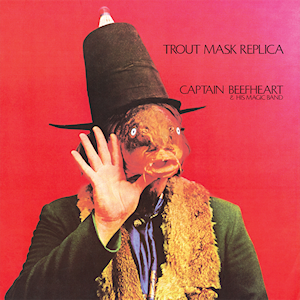 The avant garde of one generation is often the mainstream of future generations. Thus, Yoko Ono’s ululations of the Sixties influence The B-52s’ warbling in the Eighties; Velvet Underground’s dark, jagged art-rock informs punk and postpunk bands too numerous to mention. And the blues-based weirdness of Captain Beefheart & His Magic Band is reflected in everything from jazz-rock fusion to a host of modern rock acts.
The avant garde of one generation is often the mainstream of future generations. Thus, Yoko Ono’s ululations of the Sixties influence The B-52s’ warbling in the Eighties; Velvet Underground’s dark, jagged art-rock informs punk and postpunk bands too numerous to mention. And the blues-based weirdness of Captain Beefheart & His Magic Band is reflected in everything from jazz-rock fusion to a host of modern rock acts.
Beefheart, also known as Don Van Vliet, put out a handful of more or less straight blues and R&B records in the mid-Sixties, including a single of “Diddy Wah Diddy” that made the charts in much of the U.S. and in Europe. In 1969, though, he took the music world by storm with Trout Mask Replica, originally released on Frank Zappa’s Straight Records label, and the next year picked up by Reprise, which reissued much of Beefheart’s oeuvre to coincide with release of a box set in 1999.
Trout Mask is a semi-symphonic blast of sound, at once complex and primitive; an artifact of the Sixties and a timeless relic of the universal. Beefheart combines Muddy Waters’ growl, Allen Ginsburg’s howl, modern jazz’s polyrhythms, P.T. Barnum’s hucksterism, and Richard Brautigan’s gothic pastoral surrealism into a heady and sometimes disturbing concoction. Listening to this stuff can be like watching a movie of a train wreck, shown forwards and backwards at the same time. It’s frightening and fascinating and try as you might, you can’t tear your eyes — or in this case your ears — away.
The secret to Trout Mask, as pointed out by fellow Green Man Review staffer Big Earl Sellar, is to listen to the patterns, and most of all the spaces between the notes and the beats. Ignore for a while the lyrics; they’re like the frosting on this weird cake.
As much as this music sounds random and chaotic, it was actually carefully scripted by Beefheart. He didn’t read or write music, so he taught it note-for-note to his band members. I find it helpful to listen with headphones; it’s also good to have practice at listening to complex contrapuntal pieces like Bach’s Brandenburg Concerti. Most of these pieces follow a similar pattern, in which the two lead guitars, bass and drums all start out playing seemingly unrelated lines (sometimes in different time signatures) which twine about one another in intricate interplay, coming together, separating again, and reuniting once more. Over it is sometimes laid Beefheart’s gruff vocals or his skronking saxophone.
Beefheart’s blues antecedents are stronger on some pieces such as “Dachau Blues,” “Ella Guru,” and “Pachuco Cadaver,” which includes Chuck Berry-style guitar licks. “Orange Claw Hammer” is an a capella tour de force that draws on American folksongs like “Blue Tail Fly” and sea chanties. “Ant Man Bee” uses humorous images to paint a stark picture of humanity’s penchant for war. And “Steal Softly Thru Snow” is poetically poignant, with the delightful couplet refrain, “Steal softly thru sunshine/steal softly thru snow.”
The lengthy album — nearly 80 minutes of it — comes to a crashing climax on the final track, “Veterans Day Poppy,” a straightforward psychedelic blues instrumental. Well, straightforward except for the alternating time signatures.
The guitar and bass sounds and techniques of Bill Harkleroad, Doug Moon and Mark Boston are echoed today in low-fi indie bands like Sebadoh, Jon Spencer Blues Explosion, Truck Stop Love and noise-rockers Sonic Youth. And it’s hard to listen to Beefheart’s gruff vocals without hearing their influence on Eddie Vedder, whose band Pearl Jam also flirts with odd time signatures and offbeat sound collages.
You may get the idea by now that Trout Mask Replica is not easy listening. It’s challenging, demanding, often harsh and dissonant music. But an open mind and repeated, careful listening reveal intricate patterns amid the seeming chaos, and even occasional beauty amid the clatters and howls.
You can learn a lot more about it on this fine Vox video called “Why this awful sounding album is a masterpiece.”
(Reprise 1970)
